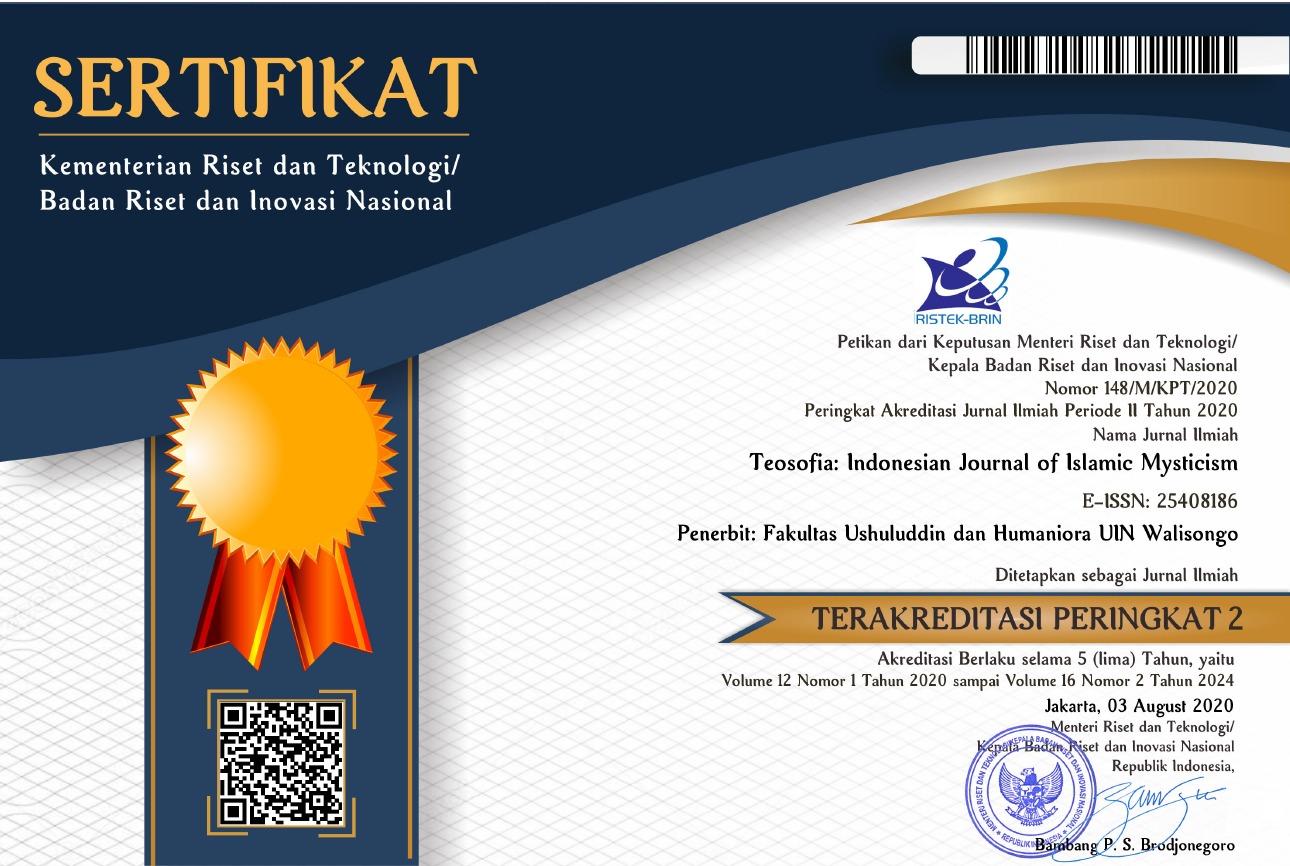The Javanese Mystical Epistemology in Kitab Primbon Betaljemur Adammakna and Its Implication to Inclusivism
DOI:
https://doi.org/10.21580/tos.v13i1.20933Keywords:
Kitab Primbon, Betaljemur Adammakna, inclusivism, Javanese mysticismAbstract
Javanese culture is rich. It has been practiced from generation to generation and still exists today. One kind of Javanese treasury in the form of work is Kitab Primbon (Book of forecasts), which is often used as a reference in various aspects of the life of Javanese people, such as marriage, business, work, predicting the future, and even knowing someone's character. This study aims to investigate the Kitab Primbon Betaljemur Adammakna, a book owned by Sultan Hamengku Buwono of Yogyakarta, which was rewritten by Pangeran Harya Tjakraningrat, regarding its epistemology and implications for inclusive attitudes. This study is classified as qualitative research, with the primary data collected from Kitab Primbon Betaljemur Adammakna. This study applies descriptive analysis. The results reveal that this book has Javanese mystical epistemology. Even though it is considered not to have a rational basis, it is believed to be valid among Javanese people and is thus still used as a reference for their lives. The book has profound implications for attitudes of tolerance in pluralistic Indonesian society. Through recognition of the plurality of spiritual paths, awareness of unity in diversity, karma, and compassion, and an attitude of humility and piety, this book encourages individuals and society to develop an inclusive attitude of tolerance and respect for the diversity of religions and beliefs.
Contribution: This study provides an understanding of tolerance attitudes inspired by the local wisdom of Javanese people, i.e., Kitab Primbon.
Downloads
References
Ahmadi, Asmoro. Filsafat Dan Kebudayaan Jawa. Sukoharjo: CV Cendrawasih, 2004.
Bagir, Haidar. Epistemologi Tasawuf Sebuah Pengantar. Bandung: Mizan, 2017.
Cakraningrat, Harya. Kitab Primbon Betaljemur Adammakna Bahasa Indonesia. Yogyakarta: CV Buana Raya, 1994.
Gunawan. “Marriage Prevention Due to Fortune-Telling of Primbon Based on the Perspective of Islamic Law (A Case Study of Marriage in Sidomukti, Bandungan, Semarang).” IAIN Salatiga, 2015. http://e-repository.perpus.uinsalatiga.ac.id/281/.
Hermin, Sidarta, and Putu Anom Mahadwartha. “Javanese Lunar Calendar Effect (Primbon) on Abnormal Return.” In Proceedings of the 15th International Symposium on Management (INSYMA 2018). Paris, France: Atlantis Press, 2018. https://doi.org/10.2991/insyma-18.2018.11.
Himawanti, Izza, Imam Faisal Hamzah, and Muhammad Faiq. “Finding God’s Way: Spiritual Well-Being on the People Who Do Tirakat Mlaku.” Teosofia: Indonesian Journal of Islamic Mysticism 11, no. 1 (June 6, 2022): 43–62. https://doi.org/10.21580/tos.v11i1.10721.
Maola, Mochammad, and Syed Mahbubul Alam Al-Hasani. “Rajah: Islamic Talisman for Overcoming Disease.” Teosofia: Indonesian Journal of Islamic Mysticism 12, no. 2 (December 13, 2023): 163–82. https://doi.org/10.21580/tos.v12i2.18845.
Mufid, Fathul, and Abd Hakim Mohad. “Indigenous Theosophy in Indonesia: Conception and Meaning of Mystical Philosophy in the Naqshabandiyyah Al Mrikiyah Text.” QIJIS (Qudus International Journal of Islamic Studies) 10, no. 2 (December 20, 2022): 357–280. https://doi.org/10.21043/qijis.v10i2.16415.
Musta’id, Ahmad. “Perubahan Perilaku Masyarakat Petani Muslim Undaan Kudus Terhadap Sistem Penanggalan Jawa Pranata Mangsa 2000-2018.” Journal of Islamic History 1, no. 2 (August 23, 2021): 120–37. https://doi.org/10.53088/jih.v1i2.111.
Ninik, Elika, and Nurhayati. “Metafora Konseptual Aksara Jawa Dalam Serat Centhini: Kajian Linguistik Kognitif.” Diglosia: Jurnal Kajian Bahasa, Sastra, Dan Pengajarannya 7, no. 3 (2024): 431–44. https://doi.org/10.30872/diglosia.v7i3.1038.
Pamungkas, Hari, and I Made Suparta. “Name Change in the Javanese Cultural System in Serat Tata Cara Nipun Tiyang Ngluwari Punagi.” IOP Conference Series: Earth and Environmental Science 175 (July 24, 2018): 012122. https://doi.org/10.1088/1755-1315/175/1/012122.
Purwanto, Wachid E. “Transkripsi Aji Dan Mantra Dalam Primbon Ajimantrawara,” 2018. https://doi.org/10.31227/osf.io/tp94r.
Putro, Sasongko S., Dedi Yusar, and Nanang Sutisna. “Cirebon Manuscript Digitalization Model.” In Proceedings of International Seminar on Indonesian Lecturer Is Born to Report Regularly, 104–112. India: Novateur Publication, 2023. https://novateurpublication.org/index.php/np/article/view/74.
Qodir, Zuly, Krismono, and Irwan Abdullah. “Salafism in Rural Java: The Struggles of Indonesian Islam Since the Fall of the New Order.” QIJIS (Qudus International Journal of Islamic Studies) 11, no. 2 (2023): 247–78. https://doi.org/10.21043/qijis.v11i2.7953.
Schimmel, Annemarie. Dimensi Mistik Dalam Islam. Jakarta: Pustaka Firdaus, 2009.
Setiawan, M.Pd, Arif, and Musaffak Musaffak. “Praktik Mistisisme Jawa Dalam Novel Partikel Karya Dewi Lestari.” KEMBARA Journal of Scientific Language Literature and Teaching 6, no. 2 (July 11, 2021): 267–78. https://doi.org/10.22219/kembara.v6i2.15249.
Sudardi, Bani. “Konsep Pengobatan Tradisional Menurut Primbon Jawa.” Humaniora 14, no. 1 (2002): 12–19. https://doi.org/10.22146/jh.740.
Sulistyorini, Dwi. “Mistisisme Islam-Jawa Dalam Ritual Haul R.M. Iman Soedjono Di Pasarean Gunung Kawi.” Kejawen 1, no. 1 (March 31, 2021): 26–36. https://doi.org/10.21831/kejawen.v1i1.40113.
Sururin, and Moh. Muslim. “Islam Dan Kesusastraan Jawa: Telaah Kepustakaan Jawa Pada Masa Mataram.” Jurnal Bimas Islam 11, no. 1 (2018): 135–164. https://doi.org/10.37302/jbi.v11i1.49.
Tafsir, Ahmad. Filsafat Ilmu Mengurai Ontologi, Epistemologi, Dan Aksiologi Pengetahuan. Bandung: PT Remaja Rosdakarya, 2015.
Trisnawati, Yuli, Liza Murniviyanti, and Hayatun Nufus. “Mitologi Masyarakat Jawa Dalam Buku Primbon Betaljemur Adammakna Di Desa Saleh Agung Kecamatan Air Saleh.” Jurnal Pembahsi (Pembelajaran Bahasa Dan Sastra Indonesia) 11, no. 1 (February 28, 2021): 33–41. https://doi.org/10.31851/pembahsi.v11i1.4731.
Downloads
Published
How to Cite
Issue
Section
License
Copyright
The copyright of the received article shall be assigned to the journal as the publisher of the journal. The intended copyright includes the right to publish the article in various forms (including reprints). The journal maintains the publishing rights to the published articles. Therefore, the author must submit a statement of the Copyright Transfer Agreement.*)
Licensing

This work is licensed under a Creative Commons Attribution-ShareAlike 4.0 International License.
In line with the license, authors are allowed to share and adapt the material. In addition, the material must be given appropriate credit, provided with a link to the license, and indicated if changes were made. If authors remix, transform or build upon the material, authors must distribute their contributions under the same license as the original.
_______
*) Authors whose articles are accepted for publication will receive confirmation via email and send a Copyright Transfer Agreement.








